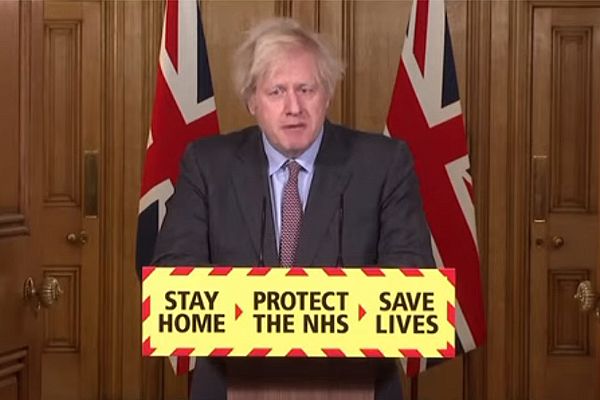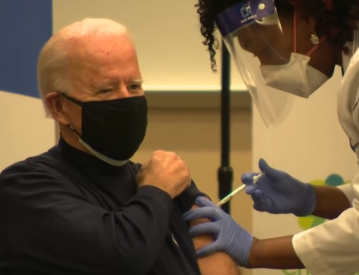In recording 100,000 deaths from COVID-19, Britain became the fifth country to pass six figures during a pandemic characterised by appalling governance, mismanagement and incompetence.
Over half of the fatalities have been recorded since November in a lethal second wave. To compound matters, a new strain of the novel coronavirus known as B117 was detected in September, found to be 70% more transmissible.
On 22 January, Prime Minister Boris Johnson did little to reassure citizens with his Grim Reaper forecast. Not only was the new variant identified in London and the South East spreading at a greater speed, but it also appeared to “be associated with a higher degree of mortality”. All that was left for the Prime Minister to do was put on a brave face that the vaccines remained “effective both against the old variant and this new variant”.
At a press conference four days later, Johnson claimed to be “sorry” in making the announcement that the death toll in Britain had reached 100,000.
He promised to remember the dead and:
“...the courage of countless working people – not just our amazing NHS and care workers, but shop workers, transport staff, pharmacists, teachers, police, armed forces emergency services and many others – who kept our country going during our biggest crisis since the Second World War.”
Such statements of desperation have invigorated the critics. Labour leader Sir Keir Starmer described the death toll as a “national tragedy” which had not been helped by a government being consistently “behind the curve” of the crisis.
Being behind the curve has been an unfortunate specialty of the Johnson Government. This is of little surprise, given the Prime Minister’s buffoonish stumbling and indifference to the dangers posed by COVID-19. He even rashly claimed in March last year that the “tide of this disease” could be turned in a matter of weeks, boasting that it was possible to “send coronavirus packing in this country, but only if we all take the steps we have outlined”.
A sense of his outlook on restrictions containing rates of infection could already be gathered in a speech delivered on 3 February 2020. Before an assembled audience in the Painted Hall at Greenwich, Johnson trumpeted the virtues of free trade and railed against the “bizarre autarkic rhetoric” that had arisen in response to “new diseases such as coronavirus”. He warned against “market segregation that goes beyond what is medically rational to the point of doing real and unnecessary economic damage”.
The scene was set for failure. A feeling that stoic Britain could weather the viral storm and prevail with confidence was cultivated. All three lockdowns were applied once the horse had bolted. The country faced shortages of protective equipment for health care workers, often due to tardy responses from the UK health department to offers of supply. The test-and-trace system deployed by the National Health Service proved to be less exemplary than was first thought. The Government’s scientific advisers found in September that the system was having little impact on rates of transmission due to “relatively low levels of engagement with [it] coupled with testing delays and likely poor rates of adherence” to self-isolation guidelines.
Confused messaging and inscrutable directions became the order of the day. In February 2020, the UK Government gave some rather relaxed advice to the health care and nursing home sector: face masks did not need to be worn by staff; visits could still take place, there being ‘no need to do anything differently in any care setting at present’. It was ‘very unlikely that people receiving care in a care home... will become infected’.
In May 2020, the official message had changed from “stay home, protect the NHS, save lives” to “stay alert, control the virus, save lives”. Prominent government advisers such as the now-departed Dominic Cummings, who flouted coronavirus restrictions on the grounds that he needed his eyesight tested, suggested that public health rules could be broken with little consequence.
Why the death toll has been so high in Britain can also be put down to other factors. Obesity, identified as a clinical vulnerability to COVID-19, has been rising in Britain.
According to a recent report from the Lifestyles Team at NHS Digital:
‘Obesity prevalence increased steeply between 1993 and around 2000, with a slower rate of increase after that. In 2018, the proportion of adults who were obese was 28%.’
Diabetes has also shown itself to be on the rise, an unwelcome addition to comorbidity. At the start of 2020, 3.9 million people had been diagnosed as having the condition, an increase of 100,000 from the previous year. Combined with such demographic factors as a large elderly population, a deadly combination was forged.
The optimists are now looking past the dead and to a bright future brought forth by the inoculating jab. Britain may have been abysmal on pandemic protections and management but it will excel in terms of vaccinations.
That, at least, is the view of such commentators as the London-based staff writer of The Atlantic, Tom McTague:
‘Even as Britain’s death tally eclipses, more than 6.5 million vaccinations have been administered than Germany or France.’
One could thank the available Oxford-AstraZeneca vaccine, ‘the most cost-effective and easiest to use of the inoculations approved so far, which was developed in Britain in part because of early and heavy government backing’.
Such an assessment comes rather close to exculpatory praise. The UK and Johnson’s government, in particular, might have botched the management of the pandemic and coping with the spread of infection, but they have an escape plan. The dead, however, will remain stark reminders to a monumental failure of public health policy.
Dr Binoy Kampmark was a Cambridge Scholar and is an Independent Australia columnist and lecturer at RMIT University. You can follow Dr Kampmark on Twitter @BKampmark.
Related Articles
- Australia’s business-driven travel policy leaves thousands stranded
- Wren's week: Victoria leads way in managing COVID-19 infections
- Compliance is a must: What we can learn about COVID-19 safety from Toronto
- The COVID-19 vaccine and the perils of political advertising
- Morrison Government duck-shoving COVID-19 responsibilities onto states
 This work is licensed under a Creative Commons Attribution-NonCommercial-NoDerivs 3.0 Australia License
This work is licensed under a Creative Commons Attribution-NonCommercial-NoDerivs 3.0 Australia License
Support independent journalism Subscribe to IA.















